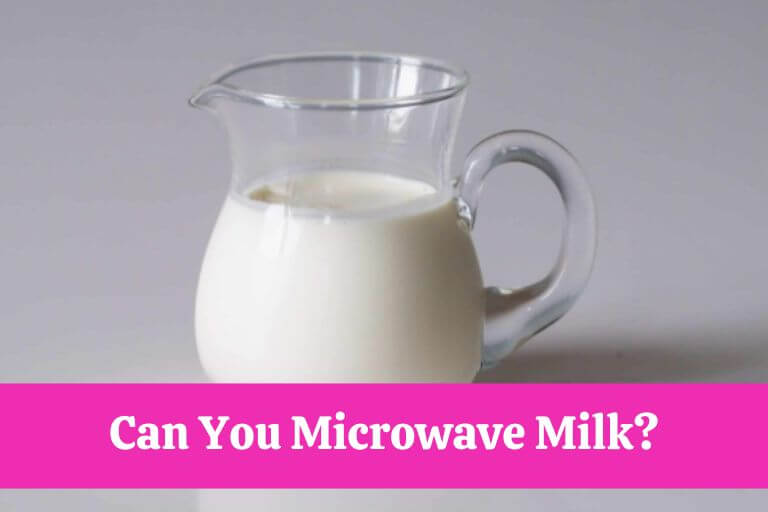We’ve all been there. You get home from work, and the last thing you want to do is cook dinner. So you open the fridge and stare at the contents for hours. Finally, you decide on a frozen pizza and pop it in the oven.
But what if there was an easier way? What if you could microwave a meal instead of cooking it? Believe it or not, you can. And in this article, we’re going to show you how.
Can you microwave Milk?
Yes, you can microwave Milk, but it’s important to do so carefully. Heating milk in the microwave can cause it to boil over and make a mess, so be sure to use a low heat setting and stir the Milk occasionally to prevent boiling. You can also heat Milk in a saucepan on the stovetop.
How to microwave Milk?
To microwave milk, you will need a microwave-safe container and Milk. Pour the Milk into the container and place it in the microwave. Heat the Milk on high for one to two minutes or until it is hot. Stir the Milk before drinking it.
What happens if you put Milk in the microwave?
If you put Milk in the microwave, it will heat up and sometimes explode. Heating milk in the microwave can cause it to scald, which makes it unsafe to drink.
Is warm Milk good for you?
Yes, warm Milk is a good source of calcium and protein. It also contains vitamins A and D, essential for maintaining overall health. Some people believe that warm Milk can help them fall asleep at night, but more research is needed to confirm this claim.
Why did my Milk curdle when I microwaved it?
Microwaving Milk can cause it to curdle because the high heat can cause the proteins in the Milk to denature and form clumps. This is more likely to happen with reduced-fat or skim Milk, which has a higher protein content than whole Milk. Heating milk for too long or at too high a temperature can cause it to curdle.
How long do you microwave milk?
You microwave Milk for about two minutes. Microwaving Milk for too long can cause it to boil over.
Does microwaving Milk destroy nutrients?
Microwaving Milk only destroys some of its nutrients. Microwaving can cause some nutrients, like vitamin C, to be lost. However, microwaving Milk also increases the bioavailability of some nutrients, like niacin and thiamin.
Does Milk curdle in the microwave?
No, Milk will not curdle in the microwave. Milk is a good choice for heating in the microwave because it doesn’t scorch or stick to the container as other liquids do. Be sure to use a microwave-safe container, however, and heat the Milk at most 1 cup at a time.
Why should we not drink Milk at night?
There are a few reasons why you should avoid drinking Milk at night. For one, drinking Milk before bed can cause indigestion and make it harder to fall asleep.
Additionally, some people have trouble digesting dairy products when they consume them late in the day. Finally, consuming Milk before bed can lead to weight gain over time, as it’s a high-calorie food.
Why do people drink warm Milk at night?
Warm Milk before bed helps some people fall asleep because it contains tryptophan, an amino acid that has a sedative effect. It also has calcium, which can help you relax and sleep better.
Additionally, warm Milk is a good source of carbohydrates and protein, both of which are nutrients your body needs for energy and rebuilding muscles.
Is curdled Milk safe to eat?
Curdled Milk is safe to eat, but it may taste poorly. When Milk separates into curds (solid) and whey (liquid), fermentation begins.
This process makes the Milk sour and changes its flavor.
If you decide to eat curdled Milk, discard any chunks of solid that may have formed and drink the remaining liquid.
What happens if you heat Milk too fast?
If you heat Milk too fast, it can scald and form bubbles on the surface. It will also produce a burnt taste. Heating milk slowly helps to prevent these problems.
Does microwaving milk cause bacteria?
No, microwaving Milk does not cause bacteria. Microwaving is one of the best methods for heating liquids because it heats them evenly and quickly without creating hot spots. This prevents the formation of bacteria.
Does microwaving Milk reduce calcium?
No, microwaving Milk does not reduce the amount of calcium. Microwaving Milk can help to preserve its nutrients.
Does microwaving Milk remove protein?
Microwaving Milk does not necessarily remove protein, although it may affect the flavor or structure of the Milk. Heating milk at high temperatures can cause it to form a thick skin on the surface, and microwaving is a type of high-temperature heating.
Protein is not the only thing that can be affected – microwaving can also change the sugars and fats in Milk, leading to changes in taste or color.
Can you heat whole Milk in the microwave for the baby?
Yes, you can heat whole Milk in the microwave for baby. You will need to heat it in a microwavable container and stir it well before serving.
Conclusion:
It is possible to microwave milk as long as you take some precautions. Be sure to heat it for a short time and stir it well, so it heats evenly. If you follow these tips, your Milk will be safe to drink after microwaving. Let us know in the comments if you’ve had success microwaving Milk this way!




